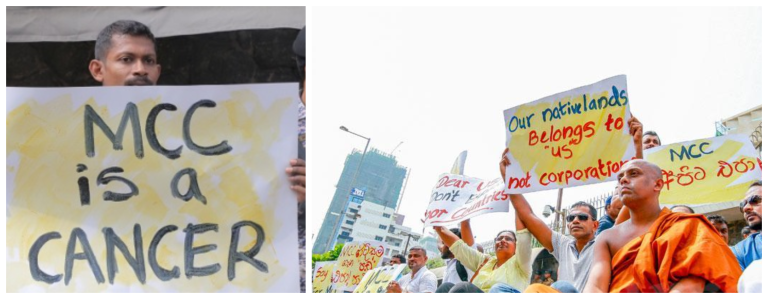The Millennium Challenge Corporation (MCC) is a bilateral United States’ foreign assistance agency’ established by the US Congress in 2004. In a strongly-worded statement reproduced below, La Via Campesina South Asia has denounced the MCC compact that is currently underway in Nepal and Srilanka.
03 JULY 2020
La Via Campesina South Asia, comprising peasant movements from the region – issue this statement in support of the struggle of people in Nepal and Sri Lanka against the United States backed Millennium Challenge Corporation (MCC).
We believe that the MCC Compact is a threat to people’s sovereignty. Some provisions place it above the existing constitutional framework of the country, which place it beyond the supervision of a local regulatory body. MCC solely represents the geopolitical interest of the US and is an instrument of new-type imperialism to pursue economic hegemony over developing countries.
In 2017, US had signed a $500 Million MCC Compact purportedly to strengthen Nepal’s power sector, and to build a cross-border transmission line to facilitate more significant electricity trade with India. Two years later, in 2019, the MCC board approved a five-year, $480 million Compact with the Government of Sri Lanka with a stated aim to reduce poverty through economic growth, and to enhance the transport sector’s infrastructure and to digitalise land administration.
As a social movement of peasants, smallholder food producers and farm workers in rural agrarian areas, La Via Campesina South Asia calls upon the governments of Nepal and Srilanka to exit the Compact and not to sign agreements which seriously challenge the right to food sovereignty. This Compact threatens our people’s right to self-determination, and political freedom, while also endangering peace in the region.
On many occasions, experts and even US officials have clearly stated that MCC is linked to the US military and Indo-Pacific strategy and is part of US National Security strategy. Signing onto the MCC and Indo-Pacific Strategy is a threat to the Panchsheel principle of non-alignment and coexistence that both Nepal, and Sri Lanka abide by.
Many campaigns and protests have clarified that the US is trying to drag Nepal and Sri Lanka into a ‘military alliance’ which is a severe matter affecting peace, harmony, and freedom. It also increases the risk of turning South Asian as a battlefield of strategic superpowers. Signing MCC will ensnare South Asian nations in a costly geopolitical conflict between the US and China and endanger our sovereignty.
It is clear to us that MCC is an extension of the US foreign policy and will impact regional peace and diplomacy. It is clear that MCC also undermines people’s sovereign rights against the principle of constitutionalism and international law. Experts also warn that there are issues in MCC projects which neither contribute to sustainable development goals nor benefits the locals.
MCC, since its initiation in 2004, has signed 37 compacts. In Madagascar, MCC funded land reforms resulted in 1.3 million hectares, or half of Madagascar’s arable land, being leased free of charge to a foreign private company for 99 years for export agriculture. In Ghana, MCC grants to the energy sector resulted in reforms that privatised one of the largest state-owned electricity providers. In Honduras, MCC funding continued months after an illegal right-wing coup, providing funding and legitimacy to an undemocratic regime.
As there is overwhelming evidence of the negative consequences of MCC agreemments in other countries, we call upon the Sri Lankan and Nepalese government to not sign the MCC compact.
As the largest alliance of peasant movements in South Asia, we affirm our strong opposition to the proposed MCC Compacts. We remind governments of the importance of decolonisation and demilitarisation of the Indian Ocean. We appeal to all members of parliament and respective governments to respect the principles of non-alignment and constitutional sovereignty of nations, and ensure the rights and freedom of the people, and not drag any South Asian country into US strategic objectives in the region.
———————–
La Via Campesina in South Asia comprises peasants, smallholder food producers and farm workers in rural agrarian areas of India, Sri Lanka, Nepal, Bangladesh and Pakistan. More than 20 independent and autonomous unions are members.

